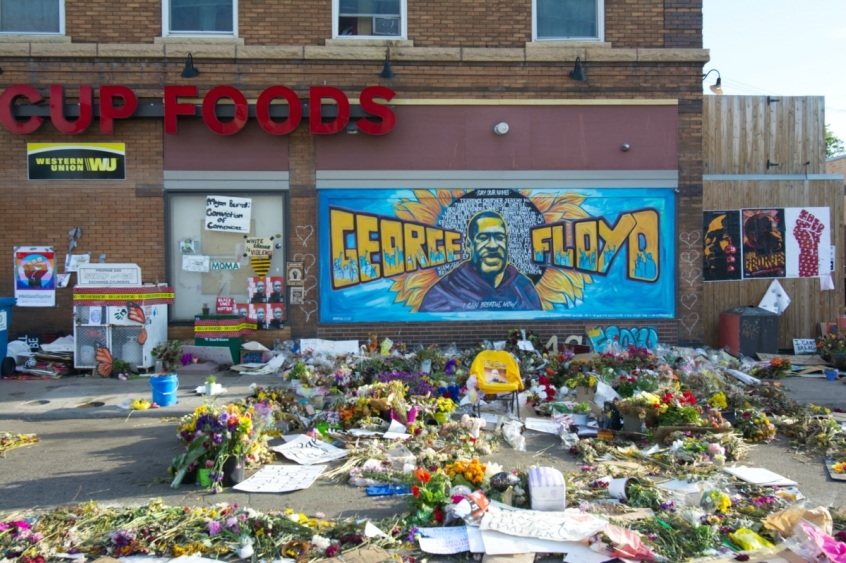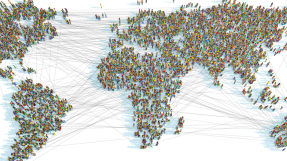
They say that 'a week in politics' is a long time, but one event in particular will have global reverberations for years to come. And this momentous event is the verdict in the trial of the police officer accused of killing George Floyd, delivered by Judge Peter Cahill on 20 April.
The world saw the callous and brutal murder of George Floyd by Derek Michael Chauvin on 25 May, 2020; they also witnessed a jury in America finally delivering justice for George Floyd last Tuesday.
A new form of citizen journalism is contributing to justice and truth; it is shining a light on corruption and the abuse of power. Things which were once hidden are now disclosed for all to see. Of course, we need to heed the warning of people like Harvard professor Shoshana Zuboff about the dangers of technology, social media, and 'surveillance capitalism', but we are grateful to the young citizen who recorded the horror of George Floyd's death.
This near-universal technology, ownership, and use of the mobile phone and its democratic distribution and dissemination of messages and images through social media, allowed the world to witness close up the public murder, execution and assassination of an unarmed black man by a law enforcement officer on the streets of Minneapolis, Minnesota.
Yes, he was unarmed and we should remember this – but we should not forget that many African American men and women have been unarmed and also lost their lives. And George Floyd was not resisting arrest; he was compliant.
Thanks to this democratic form of citizen journalism and reportage, the world witnessed the meaning of America: a veritable sign and symbol of what it is, has been and continues to be for many African Americans.
That is why the verdict in America was superlative; that's why the world waited with bated breath to see what conclusion the jury in the case would arrive at. In a sense, it was not only Derek Chauvin who was on trial for the death of George Floyd. It was America's system of justice. The jurors vicariously stood in the place of the nation. For the watching world, they were the soul and conscience of America.
John Rawls and Dr Martin Luther King Jr remind us of the importance of justice for both institutions and individuals. In his A Theory of Justice, Rawls insists that justice is 'the first virtue of social institutions, as truth is of a system of thought'. For King, justice was not only about treating people fairly and equally, under the law; it was also about the choices we make in critical moments. These choices define who we are as individuals.
And so King poignantly reminds us all that the 'ultimate measure' of a person is not where they 'stand in moments of comfort and convenience', but where they stand 'at times of challenge and controversy'. The jury was certainly dealing with a 'challenge' and 'controversy' that perpetually deforms and defiles the American body politic—the brutal and shameful treatment of its African American citizens by law enforcement officers.
But no fair-minded person could see what the late American theologian James Cone would have called 'the lynching of George Floyd' and conclude anything other than that Derek Michael Chauvin was guilty on all three counts: count one, unintentional second degree murder while committing a felony; count two, third degree murder perpetrating an eminently dangerous act; count three, second degree manslaughter, culpable negligence creating an unreasonable risk.
Although the 'system' has failed African Americans from its inception, I would like to think that Tuesday 20 April 2022 was a defining moment in America's race relations history. I use the word 'defining' with hope and caution: hope that things will really change as a result of this unanimous guilty verdict, and caution because we have been here before, especially after the election of President Barack Obama.
We wanted to believe with the great Sam Cooke that a 'change' was not only 'coming', but it had arrived. However, the symbol of a black man in the White House did not change the sociology and social reality of African Americans. Indeed, not only have we not seen the dawn of a so-called 'post-racial' America (witnessed by what happened after Obama left the White House, and the ensuing divisive cultural politics of Donald Trump), but some would argue little was achieved in terms of narrowing the gaps in employment, home ownership, income, and other areas. And of course, mass incarceration of African American men is, as Michelle Alexander eloquently and forensically states, the 'new Jim Crow' that destroys black lives, families, and institutions.
So where do we go from here? In the week that a 'guilty' verdict was recorded against Derek Chauvin, we also had the launch of two other race-related reports. The Church of England's Anti-Racism Taskforce launched its report From Lament to Action, which rightly asks why the 161 recommendations from previous Church of England reports were not implemented.
There was also the release of the report by the Board of Deputies of British Jews, the Commission on Racial Inclusivity in the Jewish Community, with its 119 recommendations.
It is no coincidence that the release of these two reports should take place in the same week as the jury delivered its verdict in the trial of George Floyd's murderer, and Stephen Lawrence Day, which fell on 22 April. The reports, like the UK government-sponsored Commission on Race and Ethnic Disparities, were all commissioned after the death of George Floyd. Indeed, the President of the Board of Deputies, Marie van der Zyl, says that it was the brutal, racist murder of George Floyd that 'sparked a reckoning about the treatment of black people all over the world'.
At a time when the world was struggling to breathe, and disproportionate numbers of black and brown people in the UK and US were dying of Covid-19, George Floyd's life was snuffed out – he was asphyxiated, suffocated, as Derek Chauvin kept his knee on his neck for 9 minutes and 29 seconds (not the infamous 8.46 seconds). But this man's senseless and callous murder inspired a global insurrection of solidarity, sympathy, and common decency in the face of the brutal and brazen murder of another black man.
If you have blood in your veins and you know the free and divine gift of breath, you cannot watch what happened to George Floyd and remain unmoved. Indeed, one white American commentator, John Kingston, writing for the predominantly white Christian audience of US magazine Christianity Today last year puts it thus: "If you are not angry and feel deep sadness in this moment, it may be time for a soul check."
This brings me to my concluding remarks, and a call to action. Racism is not 'an American dilemma', in Myrdalian terms, it is a sin. And it should be understood as such theologically, notwithstanding its political and sociological infraction of the Great Commandment to respect the neighbour as image-bearers of the divine.
Whether racism is America's 'original' sin is open to debate, but what is not open to debate is this: if President Biden is right, and that this verdict in George Floyd's murder is a 'turning point', then America must engage in a time of real and deep soul-searching to climb together that 'hill' Amanda Gorman the Inaugural Poet spoke about so eloquently:
'To compose a country committed
To all cultures, colours, characters,
And conditions of man.
Ando so we lift our gazes not
To what stands between us,
But what stands before us.
We close the divide,
Because we know to put
Our future first
Put our differences aside.
We lay down our arms
So that we can reach our arms out to one another.
We seek harm to none, and harmony for all.'
Poetically, this signals a new politics of healing that needs to take place, that must take place. But soul-searching must lead to repentance - repentance for the way in which white Christians have treated their fellow black citizens, brothers and sisters in Christ; repentance for their silence in the face of black humiliation and dehumanization; repentance for the theology and ecclesiology that sanctioned segregation and Jim Crow; repentance for the continued disfiguring and deformation of black anthropology in the face of the mass incarceration and the profiteering of a system that brutalises and diminishes the lives of African Americans.
The great poet Langston Hughes asks: 'What happens to a 'dream deferred'? That it dries up like a 'raisin in the sun' 'or explodes' has been the experience of too many. Maybe George Floyd's death will not be in vain. 'Hope springs eternal', says Alexander Pope, and so we hope that the American system of justice will change: justice will be done; justice will also be seen to be done.
That was what we saw on Tuesday 20 April 2021, as Derek Michael Chauvin was led away in handcuffs. Guilty. I am sure many black mothers and fathers will sleep and breathe easier because of this verdict.
Dr R David Muir is Head of Whitelands College, University of Roehampton, and Senior Lecturer in Public Theology & Community Engagement. He currently convenes the Pentecostal Network, is an executive member of the Transatlantic Roundtable on Religion and Race (TRRR), and Co-Chair of the National Church Leaders' Forum (NCLF). In 2015, he co-authored the first Black Church political manifesto (2015).













